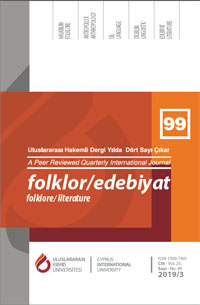Kamel Daoud’un Meursault, Contre-Enquête Adlı Yapıtında Efendi-Köle Diyalektiği
The Master-Slave Dialectic in Kamel Daoud’s Novel Entitled Meursault, Contre-Enquête
Author(s): Ayşe Tomat YılmazSubject(s): Other Language Literature, Theory of Literature
Published by: Uluslararası Kıbrıs Üniversitesi
Keywords: Kamel Daoud; Albert Camus; Hegel; master; slave; the master-slave dialectic;
Summary/Abstract: The history of humanity is based on the power wars between people, societies or countries themselves. At the end of every war they enter to prove themselves to other side, the person, who is courageous enough to lose his life, becomes the master while the person, who gives up his initial purpose because of his fears becomes a slave. In other words, at the end of a relationship, where the two forces aren’t equal, the person is either a master or a slave. While the master lives as a sovereign over the slave, the slave lives under the command of his master. The slave, who transforms objects in nature to his master and presents them to his consumption, is initially seen as a dependent consciousness. However, the slave, who distinguishes his power by working and who understands his superiority by transforming nature, evolves largely. In this way, the slave opens the door to freedom with his/her own hands and moves towards becoming a master. The aim of this study is to interpret Albert Camus’s The Stranger and Kamel Daoud’s The Meursault Investigation in the context of the master-slave dialectic of Georg Wilhelm Friedrich Hegel. The result of this research is the evolution of subject who takes place as a slave in the first novel and who becomes a master in the second novel. These novels are interpreted in the context of intertextuality but they are not studied in a dialectical context.
Journal: Folklor/Edebiyat
- Issue Year: 25/2019
- Issue No: 99
- Page Range: 623-634
- Page Count: 12
- Language: Turkish

